- Updated: May 14, 2025
Crypto addiction is quietly wrecking lives—and for business owners and leaders, the damage runs deeper than money. It hijacks focus, feeds shame, and turns strategy into survival mode.
As a Healing and Leadership Coach, I’ve seen how the struggles we try to hide—especially around control and compulsion—can quietly bleed into how we lead, relate, and perform.
In this piece, I’ll break down what crypto addiction really looks like, why it matters, and how to spot the warning signs before things spiral. No hype. Just honest insight for anyone caught between the thrill of the charts and the cost of chasing the high.
What We’re Covering (Pick Your Entry Point)
⚠️ What Crypto Addiction Really Looks Like
The word addiction gets tossed around a lot—thanks to folks like Elon Musk, Logan Paul, and even Jordan Belfort turning crypto into a hype machine rather than treating it like the high-risk, high-stakes ecosystem it actually is. But let’s talk straight.
Crypto addiction isn’t about casually checking prices or dabbling in investments. It’s the uncontrollable urge to buy, sell, or trade cryptocurrencies like Bitcoin or Ethereum—even when it’s clearly causing harm.
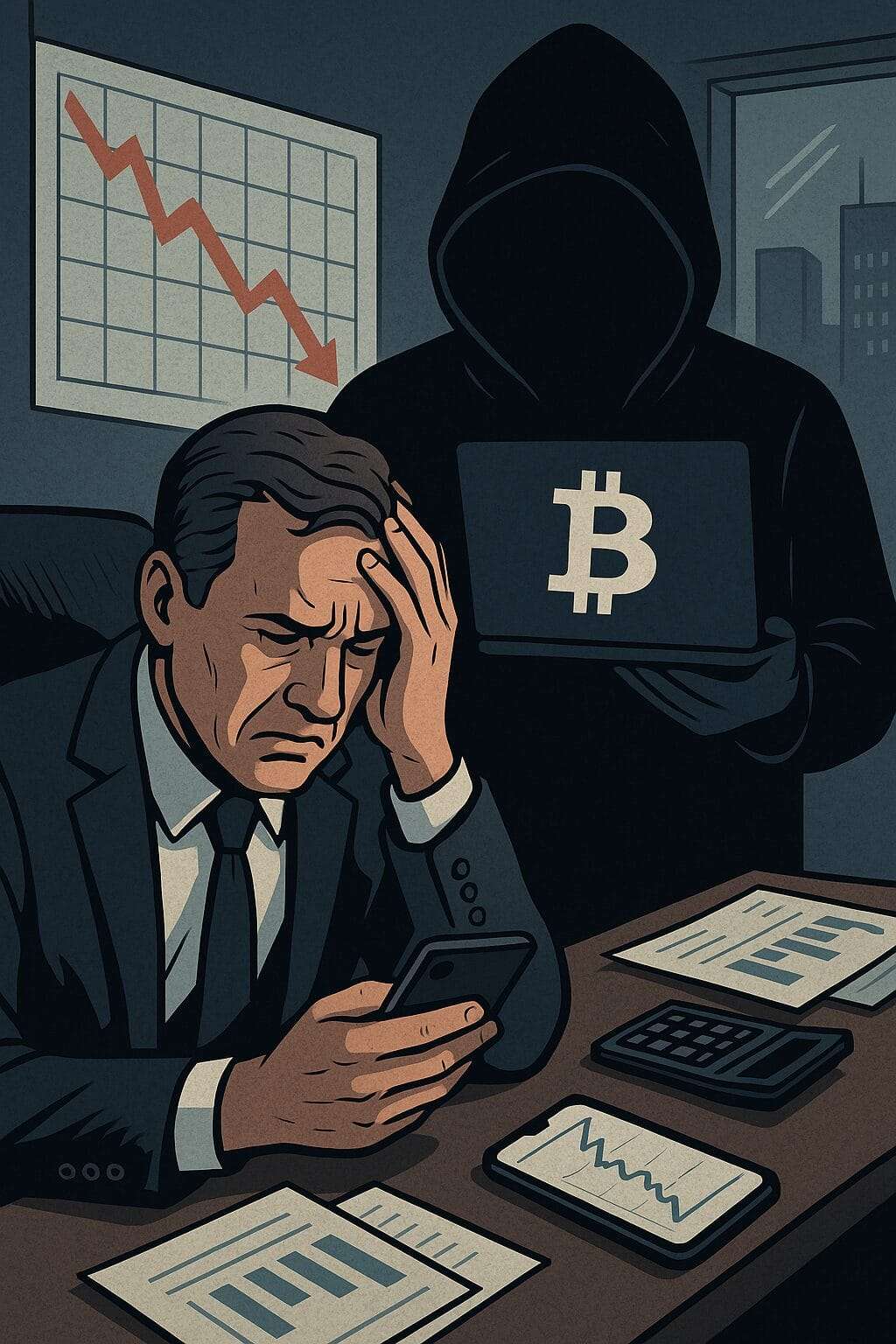
And I’m not coming at this from some detached, high-and-mighty perspective.
I had a front-row seat.
I watched my husband buy Bitcoins at $200 a pop, ride the highs, and then lose a fortune by 2018. In between, he was deep in it—building nodes, hitting every event, barely sleeping while glued to those charts. So yeah… I know alllll about it.
Crypto addiction mirrors traditional gambling: the thrill, the chase, the dopamine hit. The only difference? Crypto markets don’t sleep—and neither do the people caught up in them. And if you’re a leader or business owner, your drive to win and succeed can push this addiction to bizarre—and sometimes tragic—extremes.
🧠 Why It Hits Leaders So Hard
Let’s be real—if you’re running a business or leading a team, your decisions carry weight. People depend on your clarity, your judgment, and your ability to stay focused even when things get messy. But crypto addiction? It messes with all of that. It creeps in quietly, like a “harmless hobby” or a side hustle—until one day you realize your mind isn’t where it should be.
Instead of thinking about the next step in your business, you’re checking prices every five minutes. You’re throwing money into risky trades late at night, hoping for that one big win. You’re hiding losses, feeling anxious, maybe even lashing out at people who question you. That’s not leadership—that’s survival mode.
And I’m not judging. I’ve seen this up close, and I know how easy it is to get pulled in. What starts as curiosity can quietly turn into obsession—and when that obsession starts to impact your business, your family, your health… we have to call it what it really is: addiction.
And just to be clear—obsession isn’t the same as addiction. I wrote a companion piece that breaks down the difference between compulsive behavior and true addiction. You can read it here.
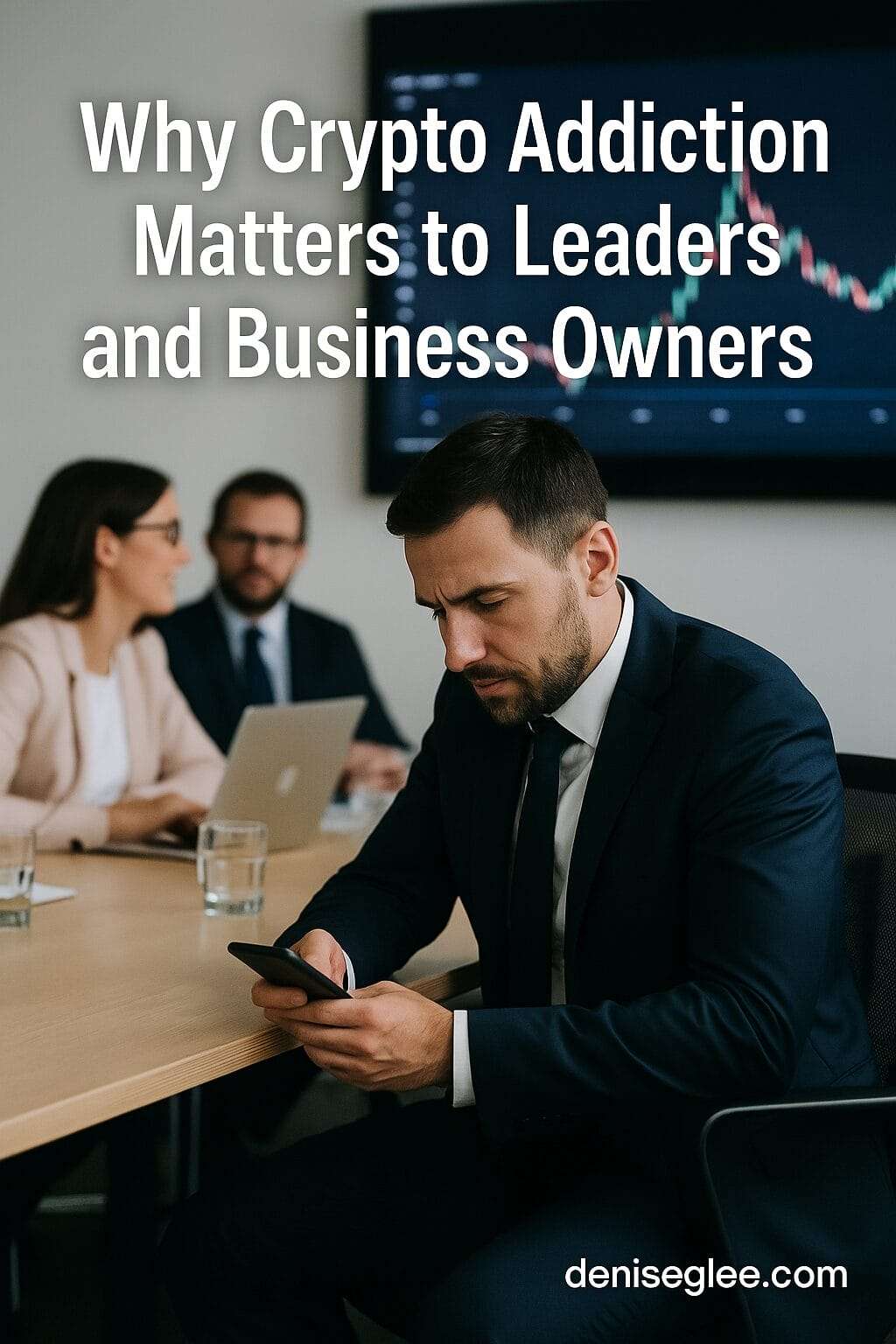
When Profit Comes from Pain: The Human Cost of Crypto Culture
We also have to face the darker reality of what’s happening in the crypto space. Take the tragic story of Arnold Haro. He was just 23. After losing money trading meme coins, he livestreamed his own death. It was heartbreaking. But what happened next? Even worse. A coin was created in his name, and people profited off it. It shot up to over $2 million in value—before crashing, of course. His pain became someone else’s payday.
And no, this wasn’t some rare horror story. This is what happens when financial systems become completely detached from emotional and ethical reality. Meme coins aren’t just jokes anymore—they’re dangerous games being played with people’s actual lives.
So here’s the hard question I want you to sit with:
Are you building a business that supports your humanity—or are you unintentionally feeding a culture that numbs it?
But before we go any deeper, let’s zoom out for a second.
Let’s talk about the brain science behind crypto addiction—because this isn’t just about willpower or money. There’s something deeper at play.
Now that we the importance and science behind crypto addiction, next let’s talk about warning signs you or someone you know is wadding to deep in the NFT waters.
🧬 The Brain Science Behind the Obsession
Crypto addiction isn’t just about poor decisions or lack of discipline. It’s chemical. It’s psychological. And it’s real.
When you engage in risky trades—especially those big “all or nothing” moves—your brain releases dopamine, the same chemical that gets triggered by gambling, sex, or sugar. That hit of excitement? That’s dopamine doing its thing.
And the more you chase it, the harder it is to stop. Over time, your brain wires itself to crave the thrill, not the outcome. That’s when things start spiraling: you’re no longer investing—you’re hooked.
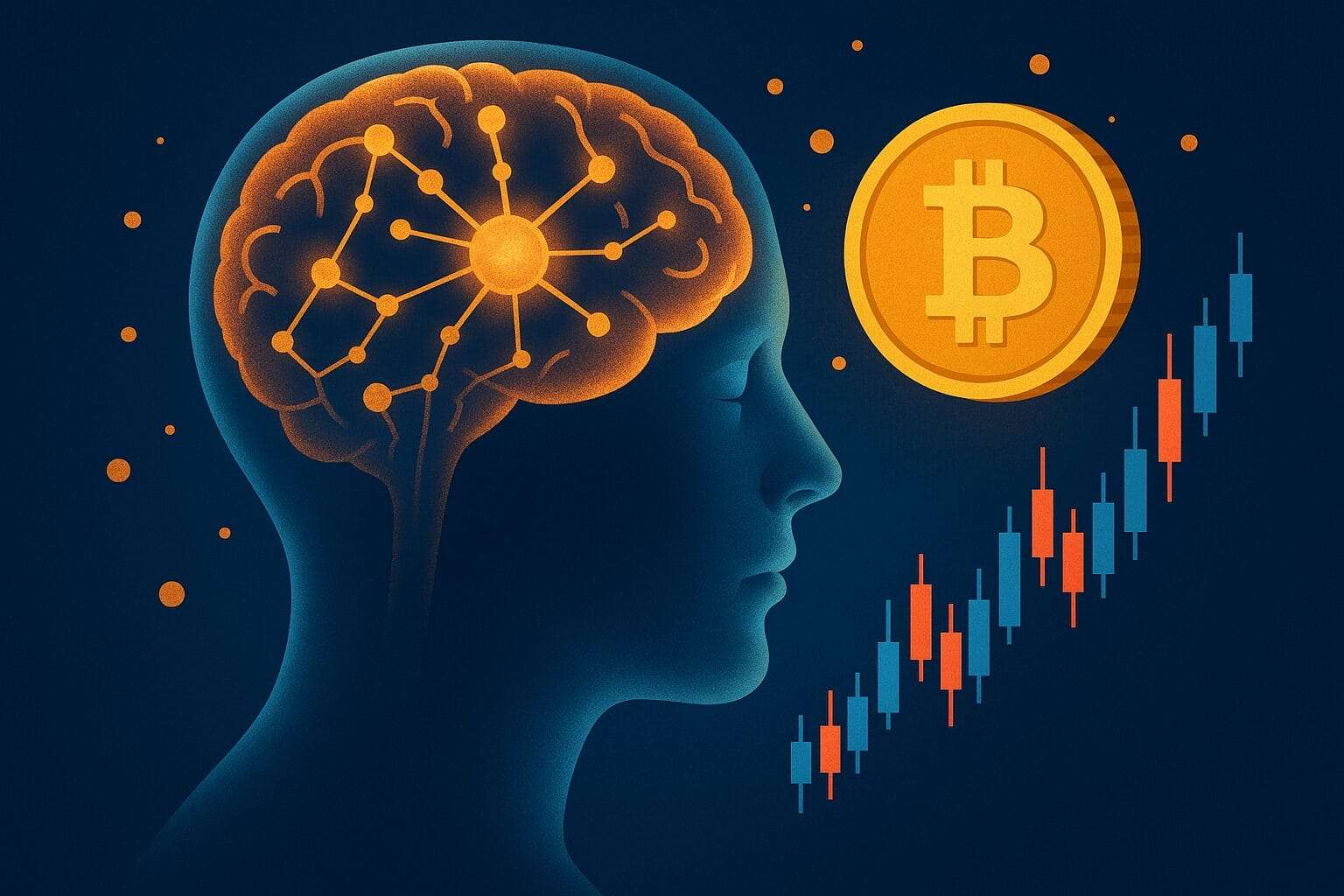
A 2020 study published in Frontiers in Psychology dug into the traits of Bitcoin investors compared to people who invested in traditional stocks. The researchers found that Bitcoin investors scored higher in novelty-seeking, gambling tendencies, and were more likely to struggle with fear of missing out (aka FoMO).
In other words, crypto traders are more likely to take big risks, act on impulse, and get emotionally tied up in market swings—especially when it feels like everyone else is getting rich.
The study also found that Bitcoin investors had more intense online engagement, like posting frequently on social media and obsessively tracking market data. Why does that matter? Because the 24/7 nature of crypto markets feeds into compulsive behavior.
There’s always something happening—and if you’re already wired for stimulation, it’s like handing matches to someone standing next to gasoline.
The $LIBRA Lie: When Leaders Fuel the Addiction
And here’s where it gets even more complex.
Crypto addiction doesn’t just mess with everyday folks—it can warp the judgment of public leaders and influencers too.
Look at the $LIBRA meme coin scandal in Argentina. Hayden Davis, a flashy self-proclaimed “hustling expert,” teamed up with Argentina’s president, Javier Milei, to promote a token that promised economic revival. The hype was wild. The token exploded in value… then crashed, wiping out hundreds of millions in savings. Davis allegedly walked away with nearly $100 million. Regular people? Left devastated.
This wasn’t just a financial scam—it was psychological warfare. Davis fed into the dopamine-driven fantasy so many people chase: fast wealth, insider access, the dream of being early. Even political leaders bought in, blinded by the same hype loop.
So here’s the uncomfortable truth: The line between addiction and exploitation is thin. And without inner grounding, even smart, well-meaning leaders can become pawns—or predators—in systems that thrive on emotional instability.
Next up, let’s talk about NFTs—because you might be wading into deep waters without realizing just how fast the current is.
🚨 5 Warning Signs You’re Not Just “Into Crypto”—You’re Hooked
Let’s not sugarcoat it—crypto addiction can sneak up on you. What starts as curiosity or “just keeping an eye on the market” can slowly take over your thoughts, your time, and your peace. Recognizing the red flags early is key. If any of these hit too close to home, it might be time to take a pause and reassess.

🔁 Preoccupation with Trading
If you’re constantly checking your phone, thinking about crypto prices while you’re in meetings, with your kids, or even lying in bed at night… that’s not just being “interested.” That’s obsession. Your brain is hooked, and it’s craving that next hit of excitement or hope.
🎲 Increased Risk-Taking
Are you throwing larger amounts of money into coins you barely researched? Are you chasing rumors, hype tweets, or gut feelings instead of making informed decisions? This kind of impulsive behavior can feel thrilling—but it’s usually a sign that logic has taken a back seat.
⏰ Neglecting Responsibilities
Maybe you’ve skipped client calls, ignored deadlines, or snapped at your spouse because you were “watching the market.” If your real life—the stuff that actually grounds and sustains you—is getting shoved aside, that’s a serious warning sign.
💸 Financial Problems
This one stings. Maybe you told yourself you’d only use your “fun money,” but somehow your savings account or business cash flow is now tied up in crypto. If you’re losing sleep over losses, dodging conversations about debt, or hiding transactions from your partner—that’s addiction talking.
😤 Withdrawal Symptoms
Ever feel restless, irritable, or anxious when you can’t check the charts? That’s not discipline slipping—it’s your nervous system reacting. Crypto withdrawal is real, and it shows up just like any other compulsion: with mood swings, tension, and a low-grade panic that something important is happening without you.
If your trades are costing you peace, focus, or sleep—it’s not strategy anymore. It’s compulsion.
💥 How It Damages Leadership and Relationships
Crypto addiction doesn’t just stay on your phone or your desktop. It spills into everything—how you lead, how you relate, how you show up in your life. And if you’re in a position of influence, the stakes are even higher.
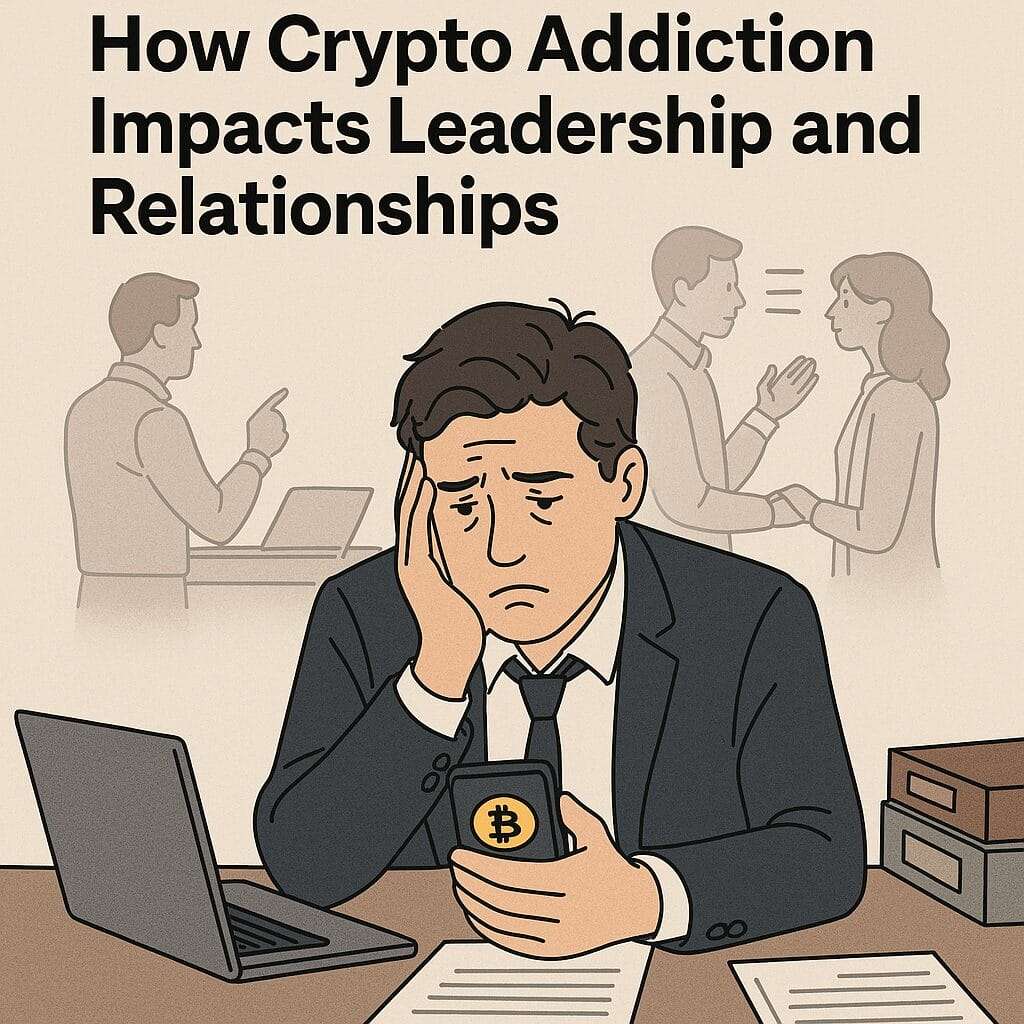
Leadership Without Presence
When your mind is glued to market movements, you’re not really leading—you’re reacting. You miss subtle cues from your team. Other days you skim over important details. Perhaps you find yourself nodding through meetings but don’t actually hear what people are saying. Your ability to make calm, grounded decisions takes a hit. And over time, people start to notice that you’re emotionally unavailable, distracted, or just plain inconsistent. That erodes trust faster than a market crash.
Decision Fatigue and Tunnel Vision
Addiction hijacks your mental energy. You become impulsive, or worse, you freeze up completely because your brain is fried from overstimulation. In leadership, that shows up as risky moves with no backup plan—or avoidance when it’s time to step up. The more wrapped up you are in the emotional rollercoaster of trading, the harder it is to see the bigger picture or lead with clarity.
Emotional Distance in Relationships
Let’s talk about the people at home. When crypto becomes your main relationship, your actual relationships suffer. You’re physically present but emotionally checked out. Conversations feel rushed. Your partner might feel like they’re competing with your screen. And if things go south financially, the tension builds fast—especially if there’s secrecy or shame involved. Trust gets shaky. Resentment creeps in.
From Inspiration to Instability
If you’re the kind of person others look up to, this part’s especially important. When you’re grounded and healthy, your presence inspires stability. But when addiction is running the show, that energy shifts. You might still sound confident, but people can feel the unease. Whether it’s your team, your clients, or your family—they sense the disconnect, even if they can’t name it. And they start to respond to that energy, whether you mean for them to or not.
You don’t need to overhaul your life overnight. Just start where you are. One step at a time.
🛠️ 6 Simple Steps to Start Healing
Let’s be honest: stepping out of crypto addiction isn’t as simple as deleting an app or “just taking a break.” This isn’t about willpower—it’s about rewiring how your brain, body, and emotions respond to stress, reward, and distraction. But recovery is possible.
Here are some simple, doable steps to help you find your way back to yourself:
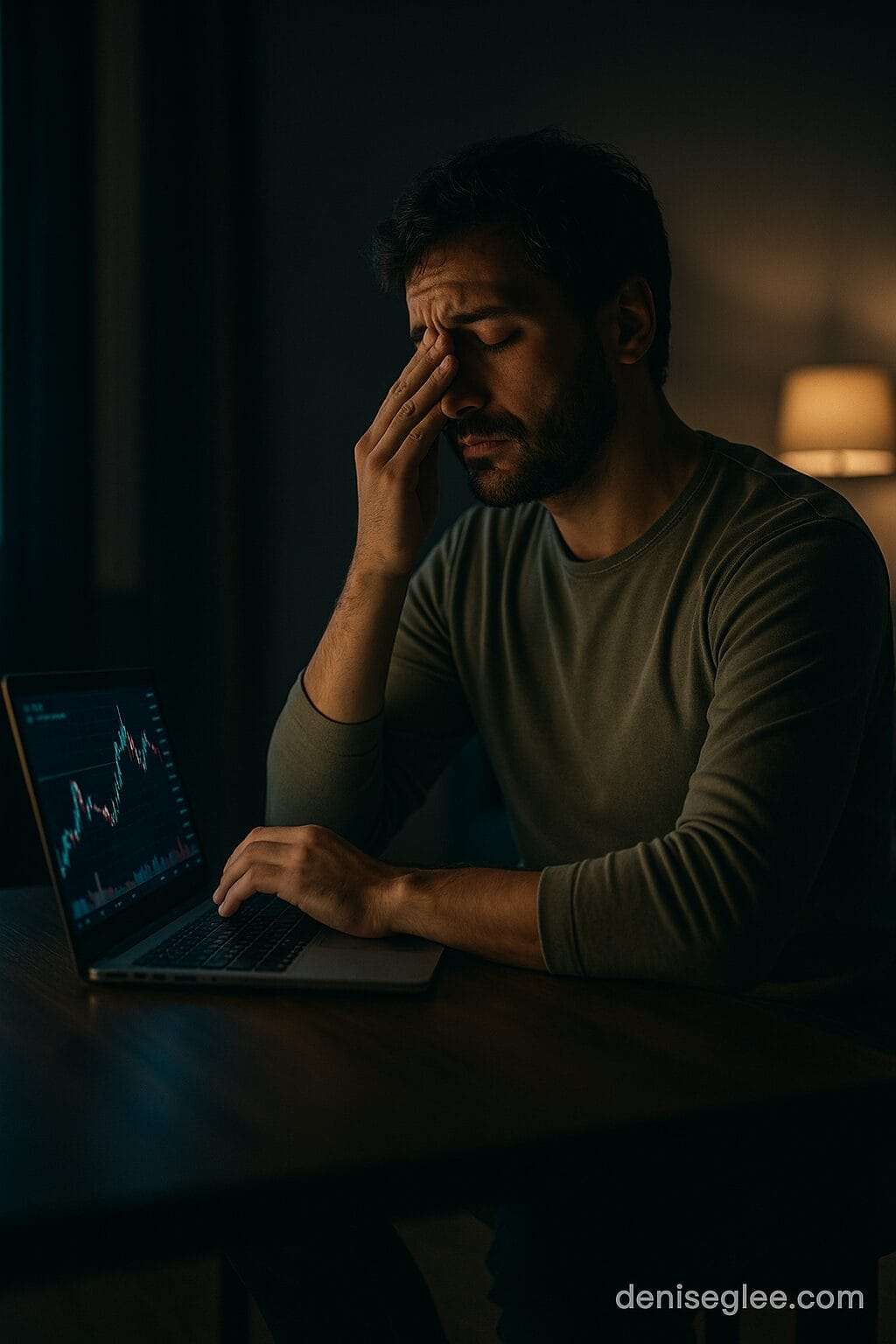
✅ Set Clear Boundaries
Decide when you’ll check the market—and when you won’t. That might mean no trading after dinner, no chart-watching during meetings, or turning off notifications when you’re with your family.
Make actual cut-off points, not just mental promises. Then honor them. And if you slip? That’s not failure. Just reset—no shame, no drama. This is about building habits that protect your peace.
💰 Limit How Much You Invest
Only invest what you can afford to lose—without wrecking your life. That means no dipping into your rent money, emergency savings, or business funds.
If it feels like a gamble, it probably is. That’s your cue to slow down. You can be curious about crypto without letting it consume your finances.
🧠 Talk to a Professional
If this is starting to feel like more than you can handle alone, you’re not broken—you’re being honest. And that’s brave.
A therapist who understands addiction (especially around money or compulsive behavior) can help you untangle what’s driving the urge. Many people find Cognitive Behavioral Therapy (CBT) helpful because it teaches you how to spot—and shift—the thoughts that keep feeding the cycle.
🤝 Connect with Others
You’re not alone in this. Seriously.
Crypto addiction can feel isolating, especially when it looks like everyone else is “winning.” But there are people—real people—who’ve been through the same thing and are willing to talk about it. Support groups, whether online or in person, create space for honesty without judgment.
Sometimes, all it takes is someone saying, “Me too,” to break that heavy shame spiral. That moment of connection can be the start of real healing. We weren’t meant to carry this stuff alone.
🧘🏾 Try Mindfulness
You don’t need to sit cross-legged on a mountain or chant mantras. Mindfulness is about paying attention to what’s going on inside—before your stress, fear, or excitement runs the show.
Here are a few easy ways to start:
Deep breathing. It sounds basic, but it calms your nervous system.
Take a walk without your phone. Yes, love—drop that electronic paperweight. Give your brain a break.
Journal. You don’t need a fancy notebook. Just write what’s swirling in your head. Even five quiet minutes can help you choose your next move, instead of reacting on autopilot.
Why does this matter? Because the more aware you are of what’s happening in your body and mind, the easier it is to make choices that actually serve you—not just satisfy a craving.
📚 Learn Without Overloading
Understanding crypto and addiction is smart. But don’t mistake constant scrolling for growth.
Endless YouTube videos or Reddit deep dives can make you feel more anxious than informed. So here’s a simple filter:
“Does this help me feel clearer—or just more overwhelmed?”
If it’s the latter, close the tab. Wisdom doesn’t live in chaos.
If you’re feeling overwhelmed, start with just one of these steps. Small changes add up. There’s no shame in starting slow.
🤝 Where to Get Help (Resources)
If you or someone you care about is struggling with crypto addiction, you don’t have to figure this out alone. Here are a few places to start:

If you or someone you care about is struggling with crypto addiction, you don’t have to figure this out alone. Here are a few places to start:
📞 SAMHSA’s National Helpline
Call 1-800-662-HELP (4357)
A free, confidential service that connects you with mental health and addiction support in your area.
🎲 Gamblers Anonymous
Crypto addiction has a lot in common with gambling. This group offers community, structure, and support from people who get it. Find a local or online meeting at www.gamblersanonymous.org.
🧠 Local Counseling Services
Many communities have therapists who specialize in behavioral addictions. Look for someone who has experience with digital or financial compulsions, not just substance use.
If any of this hit home, I want you to know—you’re not broken, and you’re not alone. Let’s wrap this up with a few final thoughts to help you move forward with clarity and compassion.
🧠 Final Thoughts on Crypto Trading Addiction
Crypto addiction isn’t just about pulling back from a screen—it’s about coming home to yourself. Your clarity. Your calm. Your power.
This work isn’t about shame or blame. It’s about honesty. If any part of this hit close to home, it might be time to pause and ask: Is this strategy… or survival?
You don’t have to keep spiraling. And you don’t have to figure it out alone.
Go Deeper
If you’re ready to stop performing and start healing—for real—I’d be honored to support you.
💛 Work with me, Denise G. Lee – Together, we’ll untangle the deeper patterns holding you back and create clear, practical strategies that match you. No hype. No formulas. Just honest, personalized support.
👉 Explore working together
🎙️ Want more real talk like this?
Listen to my podcast for unfiltered conversations on emotional growth, leadership, and the truth about healing in business and life.
👉 Introverted Entrepreneur – wherever you stream
💌 Got thoughts or questions about this article?
I’d love to hear from you.
👉 Write me a note
And just in case no one’s reminded you lately:
Leadership isn’t about being perfect.
It’s about being present. Being willing.
Showing up with your scars, not just your strengths.
That’s what makes it powerful.
That’s what makes it real.




